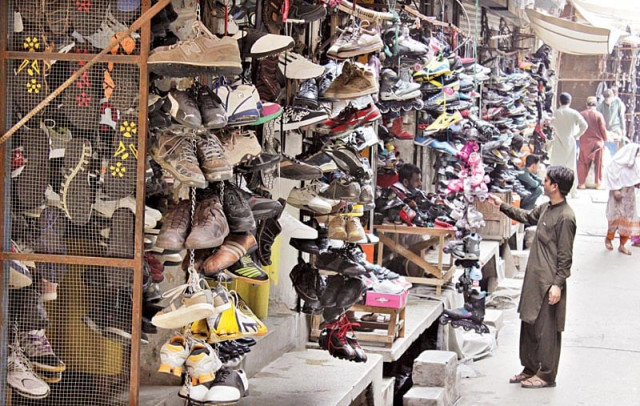Away from home: Old shoes, new business
IDPs from Fata carve their living out of used footwear.

Away from home: Old shoes, new business
As the IDPs from the tribal areas struggle to bring their lives together, many have found a new business of selling old shoes to eke out a living.
Despite their financial constraints and the lucrative nature of the business, most families believe earning a livelihood on their own is far better and fruitful than staying at relief camps.
Zafar Khan, a resident of Khyber Agency and father of six, is one example.
Khan left home in haste, leaving everything behind, after the military announced an operation against militants in the area.
“I was helpless but not hopeless and my hope for a better living and better future for my children brought me here,” he remarked.
He says he started the business with a meager Rs2,000 and now owns a five-marla house in Pir Wadhai.
He says his children are studying in good schools and living in a multi-cultural environment.
“I am satisfied as they would not grow illiterate like hundreds of others who are forced to live in those camps,” he stressed.
The landa bazaar on Jamia Masjid Road comprises around 100 shops where shoes are seen hanging outside to allure passersby.
Before the IDPs settled in the area, a few shoe shops were seen in the landa bazaar, however, since they have stated working there the number of shoe shops have swelled manifold packed with both domestic and international brands ranging from Rs400 to Rs7,000.
Bane for the poor
The business has become a boon for IDPs but a bane for most of the poor. In the past, buying secondhand shoes were synonymous with poverty and they were mostly brought by people belonging to the lower income group.
But with the turn of events, even used shoes have become so expensive that they fall in the buying range of well-off people who look forward to buying ‘imported brands’ and frequently visit the market.
“Most people cannot afford to purchase anything. Some consider it against their self-esteem, others consider it as a status symbol, and yet it is fashion for some,” said Saeed Gul, a shopkeeper and resident of Mohmand Agency.
He added that shopkeepers now preferred putting branded shoes on display as affluent families showed keen interest in paying a handsome amount for them.
“Here we find quality shoes at reasonable prices as compared to super stores in Islamabad and Rawalpindi,” said Muhammad Ismail, who owns a business in Rawalpindi.
Though the trend has benefited shopkeepers, it has made it almost impossible for the poor to afford shoes. Most shopkeepers also complained of high transportation costs, shop rent, electricity bills and washing cost for raising prices and selling expensive shoes.
“The transportation costs have increased four times than what they were two years ago,” said Sajeed Gul, a resident of Ghallanai, Mohmand Agency, adding “we have no choice but to target the higher income group.”
Published in The Express Tribune, December 8th, 2014.



















COMMENTS
Comments are moderated and generally will be posted if they are on-topic and not abusive.
For more information, please see our Comments FAQ